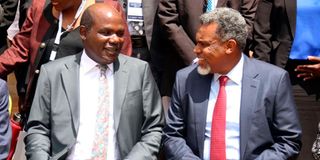Premium
Electoral violence: DPP to go after party leaders

The Independent Electoral and Boundaries Commission chairman Wafula Chebukati (left) chats with Director of Public Prosecution Noordin Haji during the Office of the Director of Public Prosecution (ODPP) staff sensitisation workshop on election preparedness at the Kenya School of Government, Kabete on April 4, 2022.
Director of Public Prosecutions Noordin Haji will now go after political party leaders for the sins of their lieutenants who propagate hate speech, incite violence or commit election-related offences.
This was revealed on Monday during the launch of the Compendium on Electoral Justice at the Kenya School of Government, where Mr Haji also opened a four-day training for institutions involved in managing elections to enhance effective prosecution of election-related cases.
The compendium, which incorporates concepts and principles of international criminal law, will enhance integrity in the electoral justice systems and promote public confidence and trust in electoral processes, Mr Haji said.
“We have adopted the Command and Superior Responsibility, where commanders and superiors are criminally responsible for crimes of commission or omission by their subordinates, especially by failing to take necessary measures to prevent them or to punish the persons responsible,” he said.
Tenets from the Rabat Plan of Action on prohibiting the advocacy of national, racial or religious hatred were also incorporated in the guidelines.
“The need to embrace and include these concepts and principles in order to ensure a just election process cannot be over-emphasised … I am confident that these principles will promote respect for human rights and the rule of law,” Mr Haji said.
Chief Justice Martha Koome commended the development of the compendium, saying it was evidence that institutions involved in electoral justice were actively enhancing their preparedness for the 2022 elections.
Failure by the Judiciary to effectively adjudicate cases arising from elections would not only damage the trust of Kenyans in election dispute resolution but also hamper the goal of achieving a successful electoral process.
“The legitimacy of the election dispute resolution process depends or rests in part on the objectivity and impartiality of dispute resolution mechanisms,” CJ Koome said.
The Judiciary too has made progress on election preparedness, CJ Koome said, especially with the setting up of the Judiciary Committee on Elections, which is implementing a comprehensive work plan. Judges and judicial officers are also being trained on electoral offences and connected matters, the Supreme Court president revealed.
Hate speech matters
All these come after the gazettement of 120 special magistrates in February this year to hear and determine matters relating to offences under the Election Offences Act. The CJ also issued a directive to magistrates handling hate speech matters under the National Cohesion and Integration Act to finalise all pending hate speech matters within four months from February.
IEBC chairperson Wafula Chebukati said the agency is mandated by the Constitution to deal with election disputes, and especially, managing the electoral code of conduct. This is after the Election Offences Act, previously enforced by the IEBC was moved under the ODPP following amendments to the law.
“We have formed a committee, led by myself, to deal with the breach of the electoral code of conduct. The code of conduct kicked in on January 20 when we gazetted the election date,” the IEBC boss said.
He also revealed that the code of conduct committee on elections handled 71 cases in 2017. Some 31 people were found culpable and fined between Sh50,000 and Sh2 million.
“We have investigators who will investigate cases of violence during the elections and bring them before the code of conduct committee and we shall deal firmly with the perpetrators,” he said.
He also said the IEBC, ODPP, National Police Service and the Office of the Registrar of Political Parties have developed a manual to be used in training police officers and ensuring everyone is prepared.
While acknowledging that the democratic system of governance in sub-Saharan Africa was fairly young, Ghana’s chief public prosecutor Yvonne Atakora said her country had focused on electoral preparedness and prosecuting electoral offences and that has helped it remain peaceful during elections since 1992.
In the past 10 years, Ghana has seen two successful petitions challenging presidential election results. One was in 2012, fronted by the New Patriotic Party, and another in 2020, brought by the National Democratic Party. In both instances, no violence erupted.
Ms Atakora cautioned that the media wields a lot of power and urged its stakeholders to ensure accurate reporting of elections that is devoid of unsubstantiated claims that would cause divisions.
“Effective and expeditious investigation of electoral offences is critical to ensuring peace and election integrity. It is important that as soon as an offence is committed that law enforcement agencies investigate promptly so that divided attention is immediately quelled,” she said.
Communications Authority of Kenya Director-General Ezra Chiloba said Kenya has greatly improved its network coverage, from 78 percent in 2017 to 96 percent now, and this would facilitate effective election processes, especially the transmission of results from polling stations.





